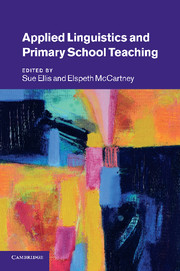Book contents
- Frontmatter
- Contents
- List of figures
- List of tables
- Notes on contributors
- Preface
- Editors' notes and conventions
- Introduction
- Part I Policy and diversity in the twenty-first-century primary school
- Part II The range and focus of applied linguistics research
- Part III Empowering teachers and teachers' use of knowledge
- Introduction to Part III
- 15 Building knowledge about language into a primary teacher education course
- 16 Using the International Phonetic Alphabet to support accurate phonics teaching
- 17 Developing word-level literacy skills in children with and without typical communication skills
- 18 The development of the Speech, Language and Communication Framework (SLCF)
- 19 How to empower teachers working with children with language impairments: why a ‘just-in-time’ model might work
- 20 Communication impairment in a multilingual context
- 21 Teacher education and applied linguistics: what needs to be understood about what, how and where beginning teachers learn
- References
- Index
21 - Teacher education and applied linguistics: what needs to be understood about what, how and where beginning teachers learn
Published online by Cambridge University Press: 26 April 2011
- Frontmatter
- Contents
- List of figures
- List of tables
- Notes on contributors
- Preface
- Editors' notes and conventions
- Introduction
- Part I Policy and diversity in the twenty-first-century primary school
- Part II The range and focus of applied linguistics research
- Part III Empowering teachers and teachers' use of knowledge
- Introduction to Part III
- 15 Building knowledge about language into a primary teacher education course
- 16 Using the International Phonetic Alphabet to support accurate phonics teaching
- 17 Developing word-level literacy skills in children with and without typical communication skills
- 18 The development of the Speech, Language and Communication Framework (SLCF)
- 19 How to empower teachers working with children with language impairments: why a ‘just-in-time’ model might work
- 20 Communication impairment in a multilingual context
- 21 Teacher education and applied linguistics: what needs to be understood about what, how and where beginning teachers learn
- References
- Index
Summary
Introduction
What teachers know and how this knowledge figures in classroom practices has been of enduring interest to governments, professional bodies and educational researchers for a very long time. The predominant way of conceptualising teachers' knowledge in relation to their practice in education policy and in much of the research has been essentially objectivist, underpinned by an acquisition view of learning (where ‘bits’ of knowledge accumulate brick-by-brick inside a teacher's head) and an input–output interpretation of learning (where what is in our heads simply migrates into yours) (cf. Edwards 2009; Ellis 2010). More than twenty-five years of empirical research into learning has questioned objectivist and input–output views of knowledge and transfer, research informed inter alia, by cognitive anthropology (e.g. Hutchins 1996; Lave 1988; Lave and Wenger 1991; Scribner and Cole 1988), ecological psychology (e.g. Bronfenbrenner 1979; Gibson 1979; Greeno 1994) and sociocultural or cultural-historical theory (e.g. Vygotsky 1978, Wertsch 1991). Yet insights into human learning and development from these perspectives have been slow to inform teacher education research and perhaps even slower to inform the design of teacher education programmes. Thus, even apparently radical shifts to school-based pre-service teacher education in countries like England – shifts that might appear to address questions of knowledge and transfer by proposing, for example, a participatory view of knowledge construction in the workplace and a sociocultural interpretation of learning transfer – instead leave these central questions to one side.
- Type
- Chapter
- Information
- Applied Linguistics and Primary School Teaching , pp. 276 - 289Publisher: Cambridge University PressPrint publication year: 2011
- 2
- Cited by



